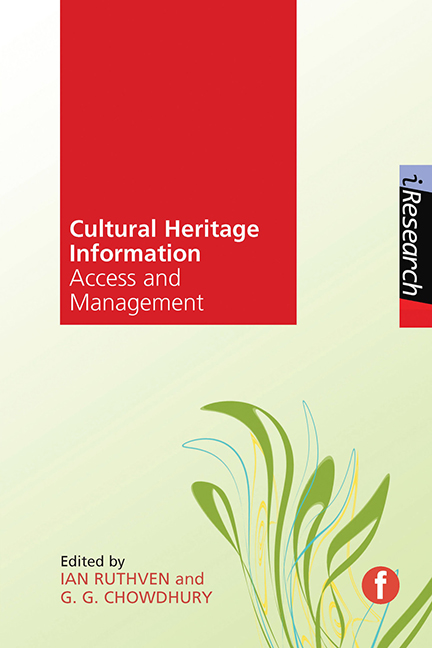Book contents
- Frontmatter
- Contents
- List of figures and tables
- Contributors
- Preface
- 1 Managing digital cultural heritage information
- 2 Digital humanities and digital cultural heritage (alt-history and future directions)
- 3 Management of cultural heritage information: policies and practices
- 4 Cultural heritage information: artefacts and digitization technologies
- 5 Metadata in cultural contexts – from manga to digital archives in a linked open data environment
- 6 Managing cultural heritage: information systems architecture
- 7 Cultural heritage information: users and usability
- 8 A framework for classifying and comparing interactions in culturalheritage information systems
- 9 Semantic access and exploration in cultural heritage digital libraries
- 10 Supporting exploration and use of digital cultural heritage materials: the PATHS perspective
- 11 Cultural heritage information services: sustainability issues
- Index
9 - Semantic access and exploration in cultural heritage digital libraries
Published online by Cambridge University Press: 10 September 2022
- Frontmatter
- Contents
- List of figures and tables
- Contributors
- Preface
- 1 Managing digital cultural heritage information
- 2 Digital humanities and digital cultural heritage (alt-history and future directions)
- 3 Management of cultural heritage information: policies and practices
- 4 Cultural heritage information: artefacts and digitization technologies
- 5 Metadata in cultural contexts – from manga to digital archives in a linked open data environment
- 6 Managing cultural heritage: information systems architecture
- 7 Cultural heritage information: users and usability
- 8 A framework for classifying and comparing interactions in culturalheritage information systems
- 9 Semantic access and exploration in cultural heritage digital libraries
- 10 Supporting exploration and use of digital cultural heritage materials: the PATHS perspective
- 11 Cultural heritage information services: sustainability issues
- Index
Summary
Introduction
Cultural heritage information collections and repositories are becoming increasingly visible on the web. The prevalence and popularity of digitization and digital preservation initiatives have given rise to numerous projects focusing on the development of sustainable cultural heritage digital libraries and collections. One of the central components of any such initiative is the conceptualization and implementation of information organization and representation strategies and tools to facilitate information access and interaction. Solid and well established cultural heritage digital libraries address informatio n organization and representation in their business, strategic and sustainability plans for effective and efficient information access and retrieval. The variety of digital objects, digital formats and digital artefacts found in cultural heritage collections make this task a challenging undertaking that requires proper planning, including not only indexing and tagging of materials but also the ways in which indexes and tags can be effectively incorporated into the information architecture and search functionalities of the underlying systems and architectures. Knowledge organization systems (KOS) have been widely used in digital libraries, subject repositories and open archives. The term ‘knowledge organization systems’ refers to a broad range of schemes for organizing information and facilitating resource description and discovery. KOS may include general classification schemes, special classification systems, thesauri, subject headings, taxonomies, ontologies, gazetteers, synonym rings and other types of standardized controlled vocabularies (Hodge, 2000). Effective and efficient organization, representation and retrieval of information on the web in general and in digital libraries in particular call for the different ways in which KOS can be utilized. KOS have the potential to provide various perspectives of a collection in the digital environment and to offer users a rich conceptual and semantic structure to facilitate search term selection for query formulation, reformulation or expansion. The use of these tools becomes increasingly relevant and important when considering the variety of information sources and formats and the need to create accessible and easy-to-use web-based search systems (Shiri and Molberg, 2005). Digital libraries, digital archives and virtual museums have made use of knowledge organization systems and controlled vocabularies. Recently, more attention has been paid to user-centred approaches to knowledge organization systems (Tudhope and Lykke Nielsen, 2006) and their integration into search user interfaces of digital libraries (Shiri, 2006; Shiri and Chase-Kruszewski, 2009) and institutional repositories (Mondoux and Shiri, 2009).
- Type
- Chapter
- Information
- Cultural Heritage InformationAccess and Management, pp. 177 - 196Publisher: FacetPrint publication year: 2015



